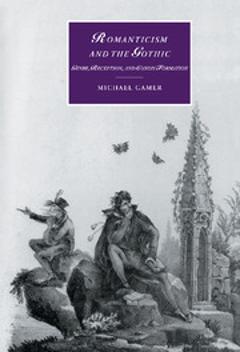Romanticism and the Gothic: Genre, Reception, and Canon Formation
This is the first full-length study to examine the links between high Romantic literature and what has often been thought of as a merely popular genre - the Gothic. Michael Gamer offers a sharply focused analysis of how and why Romantic writers drew on Gothic conventions whilst, at the same time, denying their influence in order to claim critical respectability. He shows how the reception of Gothic literature, including its institutional and commercial recognition as a form of literature, played a fundamental role in the development of Romanticism as an ideology. In doing so he examines the early history of the Romantic movement and its assumptions about literary value, and the politics of reading, writing and reception at the end of the eighteenth century. As a whole the book makes an original contribution to our understanding of genre, tracing the impact of reception, marketing and audience on its formation.
{{comment.content}}








 京公网安备 11010802027623号
京公网安备 11010802027623号